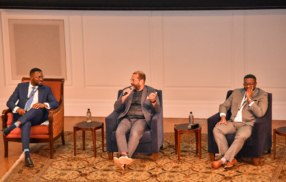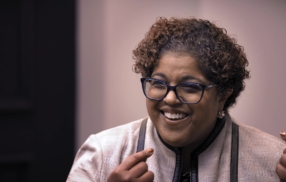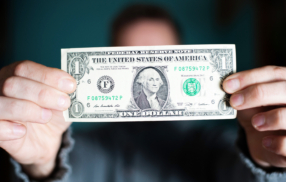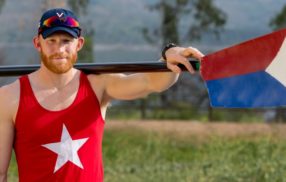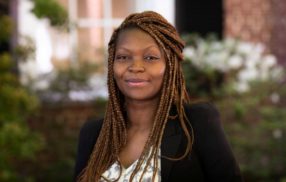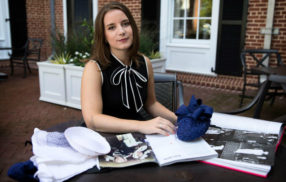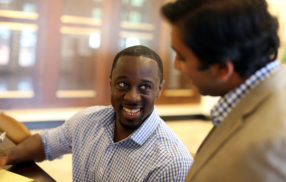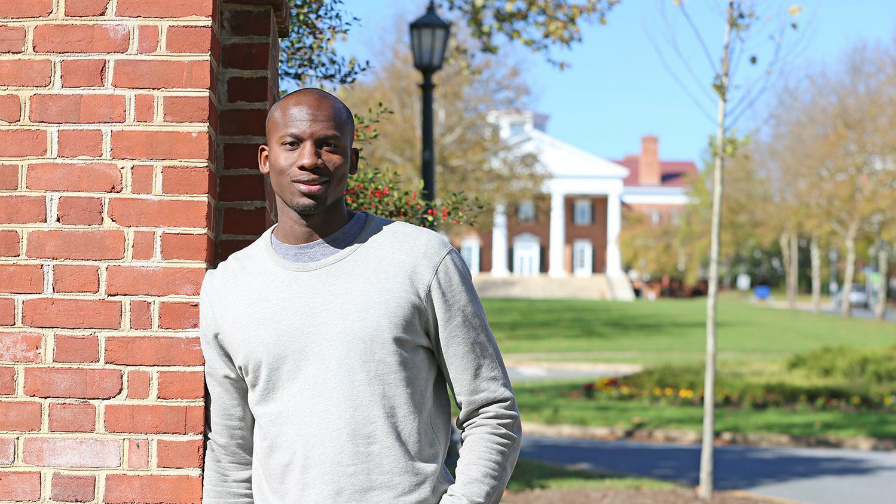
Former UVA Basketball Player Transitions from Hardwood to Business
By Jeff White
More than eight years after delivering a magical performance in his final basketball game at John Paul Jones Arena, Mamadi Diane is back at the University of Virginia, this time as a First Year at the Darden School of Business.
“It’s a good feeling,” said Diane. “It’s nostalgic. It’s kind of awkward to seem like you haven’t gone anywhere in the past 10 years, but it’s good to see familiar faces.”
Much has changed since his undergraduate days, said Diane, who earned a bachelor’s degree in foreign affairs in 2009. Back then, he had a laptop that he used periodically, but “I did not know where Excel was on my computer back then,” he said, smiling. “There’s a lot of different things that I’m using now that I had no idea how to use back then.”
At Darden, “I go to class with a laptop and an iPad and sometimes don’t even use my laptop, just my iPad, and everything’s done on there,” Diane said. “I’m writing notes on there, all the information we need, assignments. I don’t use a sheet of paper.”
Diane, a native of Washington, D.C., came to UVA in 2005 from DeMatha Catholic High School, where he starred in one of the nation’s most storied programs. When he signed his letter of intent, in November 2004, the Cavaliers’ head coach was Pete Gillen. But Gillen stepped down after the 2004-05 season, and Dave Leitao took over.
As a freshman in 2005-06, the 6-5 Diane, a graceful swingman, started 11 games, then 32 as a sophomore and 22 as a junior. As a senior, Diane was named a team captain, but he fell from favor with Leitao, for reasons never publicly stated, and averaged only 17.5 minutes per game in 2008-09.
From that trying experience, Diane said, he learned “probably the most important lesson of my life. Those first three years had really gone great, and for your last and probably your most important year, because that determines your life thereafter, for it not to go the way you anticipated, it really challenges you and tests you to your core, especially at 21, 22 years old.
“I feel like I learned everything from that moment.”
During a season in which the Cavaliers would finish 10-18, Diane endured a stretch of four straight February games in which Leitao didn’t play him. In Virginia’s penultimate regular-season game, Diane played all of three minutes in a one-sided loss at Clemson. But one of the most memorable Senior Nights in UVA history followed.
Against Maryland, which was then perhaps Virginia’s fiercest ACC rival, Diane scored a season-high 23 points, sinking 7 of 12 shots from the floor, including 3 of 4 from beyond the arc. He capped his performance by hitting the game-winning 3-pointer with 38 seconds left in a 68-63 victory at JPJ.
Even as his minutes plummeted late that season, Diane said, his focus never waned.
“I think that’s probably the hardest that I’ve ever worked in my life, even though I wasn’t playing and I was sitting,” he said. “And to show in that moment, when that opportunity came, to be able to perform in that way, I think that speaks volumes. Whatever you’re going through, with hard work and that resilience, it’ll pay off eventually. It’s not for nothing.”
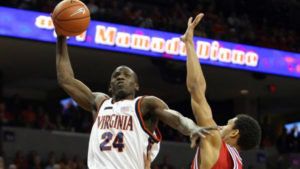
Mamadi Diane played for the UVA men’s basketball team from 2005–09. (Photo by David Petkofsky courtesy of www.virginiasports.com)
The Wahoos played one more game that season, and Diane went out with a flourish, scoring 24 points in an ACC tournament loss to Boston College. Then came a coaching change at UVA, with Tony Bennett replacing Leitao, who’s now the head coach at DePaul.
Diane bonded immediately with the new staff — not only with Bennett but with assistant coaches Ron Sanchez and Jason Williford, another former UVA player. He’s also close with Ronnie Wideman, Virginia’s associate athletics director for men’s basketball, and Mike Curtis, a former UVA player who’s the longtime head strength and conditioning coach for basketball at his alma mater.
Virginia’s new coaches arrived in Charlottesville in April 2009.
“When I first took over the job, Mamadi was one of the few guys that was still around that I met, he and Tunji Soroye,” Bennett recalled. “They really were gracious in how they welcomed myself and our staff. We told them we wanted to get this where our alumni would come back and feel comfortable to work out as they were preparing for their professional careers.”
As Diane was preparing to leave UVA, the new staff was “coming in,” he said, “and the very first time I met Coach Bennett — and I don’t know if he remembers — he asked my opinion on the [returning players], who I thought should be starting, who should be playing. I think that spoke volumes.”
Diane “just had a good way about him,” Bennett said. “I just really enjoyed getting to know him and asked him a lot of questions as we were starting this process.”
The conversations he had with Bennett and his assistants that spring, and the ones they’ve had since, impressed Diane. “I’ve never had that with my own coaches that I played for,” he said. “And I can say to this day, the relationship we have is closer than the ones that I’ve had with my own coaches. They’ve been very welcoming to me when they have no obligation to me whatsoever.”
Bennett has seen Diane play in the practice gym at JPJ. “He’d have been fun to coach,” Bennett said. “I just really appreciate having him around.”
Diane, many observers believe, would have thrived under Bennett’s tutelage. “He’s told me the same thing,” Diane said, “and yeah, I wish I could have as well. I think it would have been an ideal situation. Then again, I wouldn’t have gotten that lesson that I did, and I’d be in probably a completely different place. I may not be here right now.”
After graduating from UVA, Diane embarked on a pro career. He played in Spain — once against his former UVA teammate Adrian Joseph — and France and Latvia and Slovakia.
“That was very fun,” Diane said of his time in Eastern Europe. “The style of basketball there was much different. They put a lot of emphasis on their American players, and it’s more open. You’re able to play more free. I would say Western Europe is a lot more restricted.
“Aside from basketball and developing my game and playing at a professional level, just seeing the world was an amazing experience.”
He hadn’t given up his NBA dreams, and Diane was on the Minnesota Timberwolves’ summer league roster in 2014. Early in the Timberwolves’ first game that July, however, Diane tore his plantar fascia.
“That forced me to sit out, take some time off,” Diane recalled, “and I started working with my family at that point. We started some new ventures. We develop mining concessions in West Africa.”
Concessions are the rights, Diane said, to mine a certain commodity on a specified portion of land. Essentially, he said, it is a lease on the land that gets renewed in 10- to 25-year increments as long as the government is satisfied that the company is carrying out the job as intended.
His father, Mori Diane, is CEO of Consolidated Mining Corporation, which focuses on his native Guinea. The elder Diane and Mamadi’s brothers own the company.
“Guinea has more than a quarter of the world’s bauxite reserves, which is the ore used to make aluminum,” Mamadi said. “We developed two concessions in bauxite and three gold concessions we’re working on right now.”
A former soccer standout at Howard University, Mori Diane also is vice president of AMEX International, a Washington-based consulting firm that focuses on economic development overseas.
When he started working with his family, Mamadi said, CMC “was in its inception. It was something new. I got to learn the business, and it got to the point where I had to make a decision. We’re doing something that’s very exciting, that people live their whole lives for. My father has lived his whole life for this opportunity.”
Diane’s options: continue working in the family business or head back overseas “and continue [playing basketball] for however many years I have left,” he said.
He chose to pursue his business career, and that led him to the prestigious MBA program at Darden. He’s still adjusting, after nearly a decade away, to being back in the classroom.
“I say I’ve been challenged mentally the same way I would be challenged physically on the basketball court,” Diane said. “Eventually you get to the point in basketball, especially as a pro, where it’s routine. So it’s kind of learning it all over again, getting shocked from the beginning.”
Darden “is a very demanding school,” Diane said. “I bust my butt, and if there’s one thing I’ve learned, going from basketball to the business world, it teaches you to have a certain work ethic and to be able to be personable and to speak with people. And those are two very important things that have carried me through to this point.”
His Darden classmates recognize him as a former UVA basketball player more often than he expected.
“I didn’t think anybody would, but surprisingly they do,” Diane said. “Some of my professors as well. The first day of school I come in and either they mention something about basketball or I can tell if they pronounce my name correctly that they’ve probably watched. Surprisingly, a lot of people up there are basketball fans. It’s made the transition easy.”
He keeps up with former teammates, among them Joseph, Soroye, J.R. Reynolds, Solomon Tat and Sean Singletary.
“When we’re in the same city, we’ll get dinner, we’ll go out, we’ll do something,” Diane said.
During Diane’s career, the Cavaliers advanced to the NCAA once, in 2006–07. Under Bennett, Virginia has reached the NCAAs in five of the past six seasons. Diane has followed the program’s rise to prominence closely, watching with pride and curiosity.
“For me, any type of success or just high-level performance is always fascinating to watch and try to dissect why it works,” Diane said. “Why does this work, and what happened in the years that we had that didn’t work so much? What is the difference? I even ask some of the coaches sometimes: If you were to, say, [pick] one or two things that make this program a success, what is that? And that carries over to business and all of life, the type of things that breed success.”
Diane is in a good health these days, and for that, he said, Curtis deserves much of the credit. “He has been pivotal in my recovery and wellness and overall quality of life since before I left here [in 2009],” Diane said.
He’s become a mentor to UVA forward Mamadi Diakite, a redshirt sophomore who like Mori Diane is from Guinea. In his work with CMC, Diane said, “I was spending maybe two months in Guinea, two months back here in D.C. [Guinea] was like a second home.”
Diane said he talks regularly with Diakite, and “his father will call me from time to time to talk to him about certain things. I think the most important thing to instill in him is the [importance of] resilience and hard work, having him understand that all he has is this moment.
“It may seem long while he’s here day to day. He’s got class, he’s got study hall, he’s got practice. But it’s just the snap of a finger, and he’ll be 30 like I am, so [Diakite needs] to really cherish the moment, work as hard as he can, and have no regrets during his time here.”
His Darden schedule makes it difficult for Diane to work out with the current Cavaliers, but he makes it over to JPJ from North Grounds as often as he can.
“It’s great that he’s back,” Bennett said. “It feels like he did play here for me. He’s part of our family.”
The University of Virginia Darden School of Business prepares responsible global leaders through unparalleled transformational learning experiences. Darden’s graduate degree programs (MBA, MSBA and Ph.D.) and Executive Education & Lifelong Learning programs offered by the Darden School Foundation set the stage for a lifetime of career advancement and impact. Darden’s top-ranked faculty, renowned for teaching excellence, inspires and shapes modern business leadership worldwide through research, thought leadership and business publishing. Darden has Grounds in Charlottesville, Virginia, and the Washington, D.C., area and a global community that includes 18,000 alumni in 90 countries. Darden was established in 1955 at the University of Virginia, a top public university founded by Thomas Jefferson in 1819 in Charlottesville, Virginia.
Press Contact
Molly Mitchell
Senior Associate Director, Editorial and Media Relations
Darden School of Business
University of Virginia
MitchellM@darden.virginia.edu


